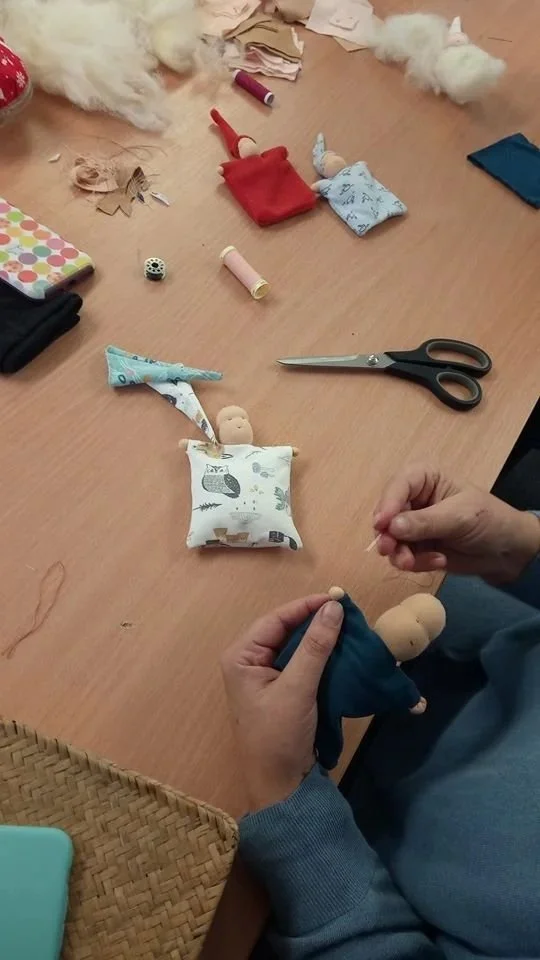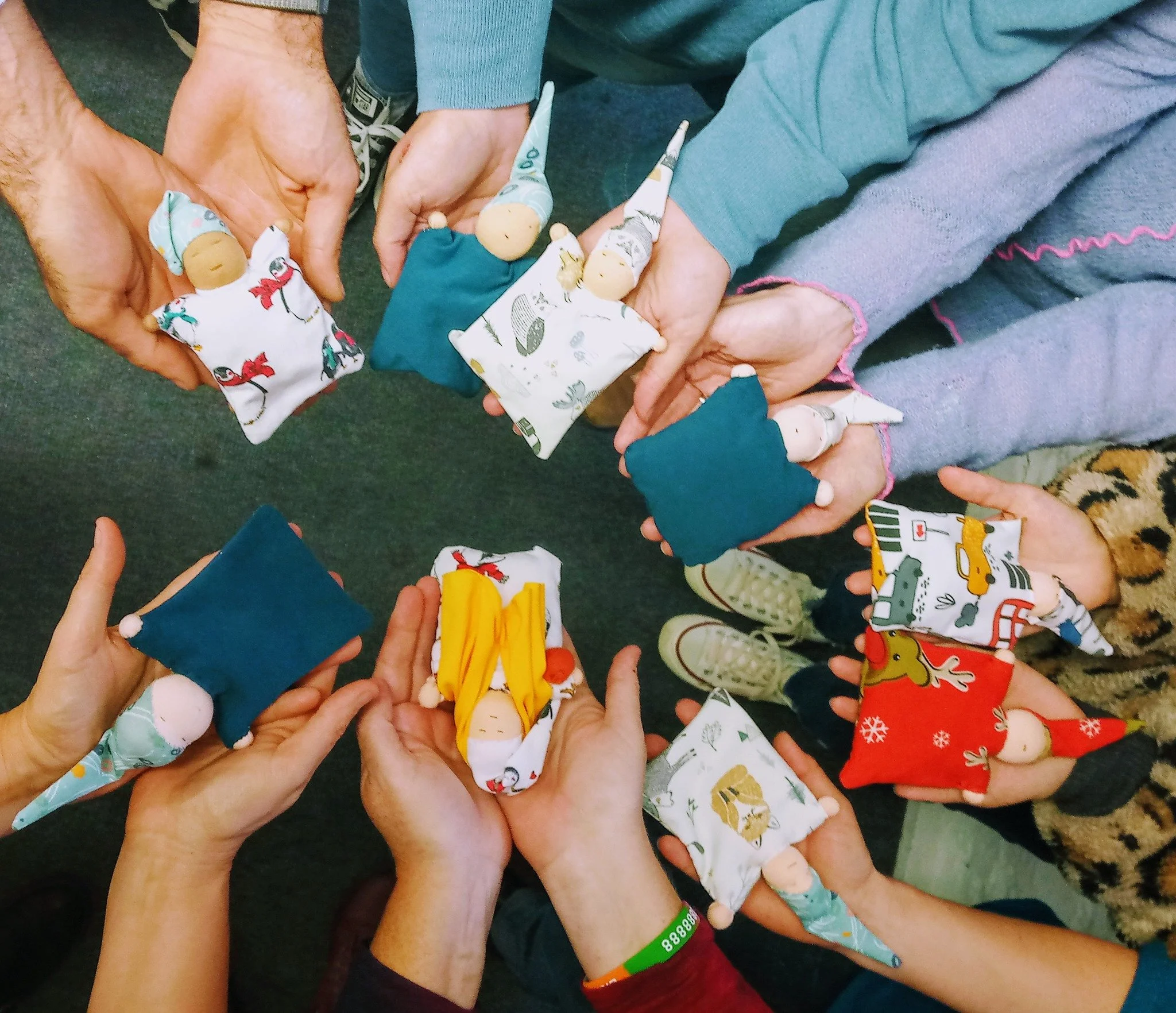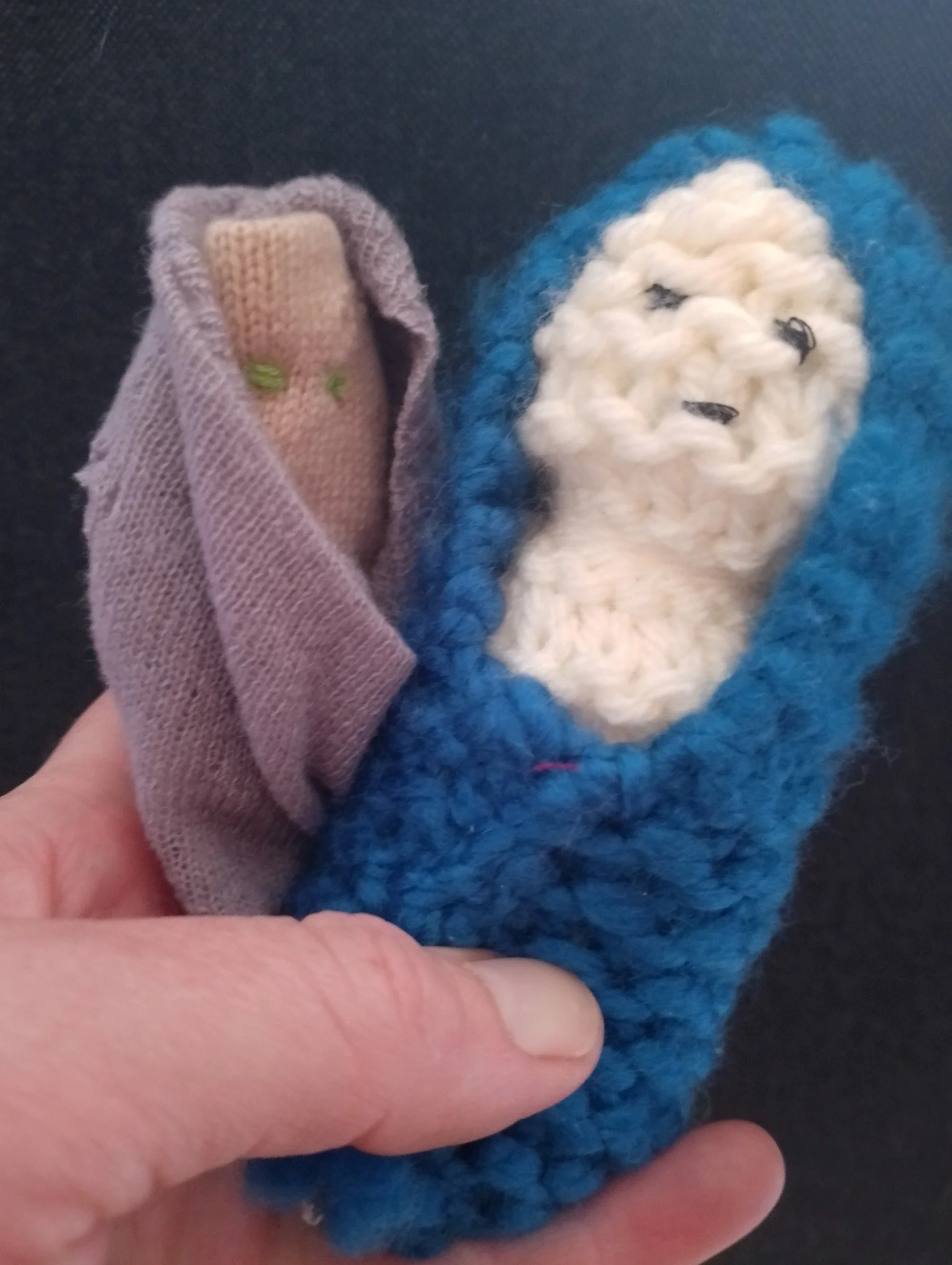About The Bábóg Project
The Bábóg Project Story
In 2018, Courtmacsherry-based doll-maker Laura Whalen started The Bábóg Project which aimed to make a small, palm-sized doll for each of the 9,000 babies that are said to have died in Ireland’s mother and baby institutions.
This project has no other aim but to acknowledge that each of these infants were human beings with human stories, no matter how short their lives and they are therefore deserving of our love, care and attention.
Laura explains: “By making a doll for each child, we are in a way sitting with them for those 2 or 3 hours that it takes. We are acknowledging that they existed, that they were important and they are worthy of our time and attention. We acknowledge their story, without ever knowing it, and the stories of their mother and father.”
Laura has been a doll-maker since 2010. “I started making dolls for my own children and just fell in love with the whole process. I particularly love making custom dolls in the image of a child. In the summer of 2018 I had a conversation with a dear friend of mine. She had been born in a mother and baby institution in Dublin. I was very moved by her story and offered to make her a tiny doll of herself: to represent the little girl she had been around the age that she had been adopted. To give her a tangible way to hold and love that little one, to hold and love the memory of herself.”
“She found that having this doll was very soothing and healing. She asked me if I could make dolls for her siblings too. They had also been born in mother and maby institutions and her little brother died there when he was just 5 weeks old and is buried in a mass, unmarked ‘pauper’s’ grave.
Of course I made those dolls; and while I made his little doll I cried, and cried, and I thought that every baby that this happened to should have someone hold them in this way; that they should be honoured in the time and love taken to make them their own little doll. That is when I did some research and realised that the numbers were staggering, estimated at 6,000 at the time. I knew there was no way I could make 6,000 dolls on my own and so The Bábóg Project was born.”
We began with a Facebook page and a couple of simple patterns that we sent via email to anyone who requested them asking them to make as many dolls as they could and post them to us. Courtmacsherry Community Shop kindly lent their address to the project and Laura would pop by every few days to collect the parcels.
She brought these back to her home and unpacked each of them. The dolls she arranged and photographed to be shared on the Facebook page.
What was unexpected were the letters and notes that came with the dolls. These were beautiful, tender and heartfelt outpourings of love, of care, of shared experiences, of relating, of heartbreak and community. Laura started to share snippets of these letters with pictures of the dolls they accompanied. Slowly the numbers of dolls were swelling and the media began to take an interest.
Laura began running a series of doll-making workshops around County Cork. These were such special experiences: at each workshop participants followed along with Laura making a little doll that they left with her. Each workshop was also a space for people to share, to hear and to hold each other.
“I am not very good at voicing my opinion but the feelings that were evoked in me during the workshop were overpowering at times. Thank you so much for giving the opportunity to share this experience with you. We as a nation should hang our heads in shame for the manner in which those little babies and their mothers were treated. Let’s stop blaming and take responsibility as a nation and begin the journey of trying to make amends.”
COVID-19 locked the country down in early 2020. Many hands left idle, many hands that then picked up needles and thread, yarn and hooks, and created. We were flooded with parcel after parcel filled with the most incredible creations, accompanied by truths written loudly, quiet prayers and blessings and by deeply held silences. On All Souls’ Day 2020, we announced that we were no longer accepting dolls and began to count all the dolls that had arrived.
12,000.
Such a staggering response. Double our original target. A testament to how much we care. To how sorry we are. To how broken our hearts are.
From its inception The Bábóg Project was always about process, and as such there was never a firm idea of what would happen to the dolls once we had made and gathered them all. We explored a number of ideas: a travelling exhibition or a permanent home in a museum, gallery or other public space. However, these were logistically difficult or impossible. While we were looking at all the possibilities we felt it important that we laid all of the dolls out together. That we capture the scale of the work, that they are witnessed and seen.
According to what the COVID-19 regulations allowed at the time, a small group of women gathered on a cold, crisp December morning in Courtmacsherry to do the work of laying out all 12,000 dolls. Zucca Films filmed this process and captured it here:
In early 2021 we launched our virtual exhibition. The online exhibition is a curation of words and images. The images are of every single doll that was sent to the project and the words are snippets taken from the letters, cards and notes that accompanied many of the dolls. It is a beautiful and comprehensive recording of The Bábóg Project.
Then there came a natural pause in activity. The world slowly returned to some kind of normal after COVID-19, we all regrouped, regathered, refocused.
For Laura, curator of the project, the busyness of life took centre stage:
“It was a very difficult time for me and my family. There were several huge changes in our lives that had a massive impact on myself and my children. This had to become my focus and my work on The Bábóg Project had to wait until we were in a stable enough place to do so. When this eventually happened in 2024, it took me several more months of trying to find the right ending, the right way to finish The Bábóg Project. Again I looked at many avenues until I finally realised that the dolls should leave the project in exactly the same way that they arrived: into the hands, the hearts and homes of many.”
We devised a way in which we could invite people to take a doll, or many, and give them a home. To weave them into a part of a new story. With the help of Christopher Whalen we added a feature to our website which would allow people to request dolls and pay for their postage.
Before we began posting out dolls we decided to hold a single public event at which we would lay out all 12,000 again and for the very last time. This beautiful day took place on 31 May 2025 in St Peter’s in Cork.
From 1 June until mid-July 2025 The Bábóg Project received hundreds of requests for dolls. These came from individuals, from families, from communities, from every county in Ireland and many countries around the world. John, the post master at Lislevan Post Office, gave up many lunch hours to process all of the parcels. It was an incredible response that took us by surprise: in 6 weeks 11,000 dolls had left the project.
We asked people to share pictures and images of what they have done with their little Bábóga, and what it has meant to them to receive them. These images and stories we have and continue to share on our Facebook page. These sharings are so touching, so unique to each individual and to each family, and are such a meaningful reflection of the significance that the dolls hold.
“We visited Ballyheigue today and my little Babog Norah came with us. In memory of a beautiful baby who should have enjoyed her life. and her family. Xx”
“It was hard to choose a lil babóg to bring home as I recognised a lot of them from the project. So beautiful, so so tiny. It broke my heart to be honest, recognising them, unlike the babies they represent were. It’s happening now though, and I hope they can feel the love of our community as well as the broken hearted parted from them.”
On 15 July 2025 Laura and her partner Tommy packed up a basket of some of the last of the dolls and travelled to Leinster House in Dublin. Senator Nicole Ryan had learned about the project and wanted to host a coffee morning for us there, inviting Ireland’s Senators and TDs to come and learn about this incredible project and take a doll. You can read more about this day here.
What’s next?
While this part of The Bábóg Project draws to a close the legacy of this work remains. It is a project that has touched the hearts of many thousands of people. It is a project that has made something hugely significant out of nothing more than human kindness, connection and community. It is a project that has meant so many different things to so many different people and it has had the capacity to hold it all. It is a project that has inspired: it has inspired people to craft and create. It has inspired people to reach out to each other. It has inspired people to talk and to share their stories and their pain. It has inspired people to activism, in the most gentle way. It has inspired people to connect with their deepest human natures, to say to each other and themselves: we are good enough, we are enough, we are good.
Although The Bábóg Project will no longer be open to receive and send dolls, we still maintain that the making of a small doll, as an act of love, care and attention is worthwhile, and we would encourage you to follow the steps of the project yourself. Take the time to make a doll (patterns can be found here), in memory of one of Ireland’s babies that died in a mother and baby institution, sit with that dolls for as long as you need, as long as it takes. Feel your feelings about it and share them, and then decide what you would like to do with the doll. Of course we would love to hear about your process which you can share with us via email thebabogproject@gmail.com, our contact form or on our Facebook page.
To everybody who participated in The Bábóg Project, we send you an enormous thank you.






